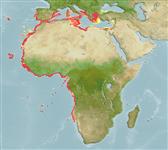Preferred temperature (Ref.
115969): 13 - 16.8, mean 14.9 (based on 168 cells).
Phylogenetic diversity index (Ref.
82804): PD
50 = 0.5001 [Uniqueness, from 0.5 = low to 2.0 = high].
Bayesian length-weight: a=0.01148 (0.00900 - 0.01464), b=3.03 (3.00 - 3.06), in cm Total Length, based on LWR estimates for this species (Ref.
93245).
Niveau trophique (Ref.
69278): 3.5 ±0.44 se; based on food items.
Résilience (Ref.
120179): Milieu, temps minimum de doublement de population : 1,4 à 4,4 années (K=0.16-0.25; tmax=13; tm=2).
Prior r = 0.98, 95% CL = 0.65 - 1.47, Based on 1 data-limited stock assessment.
Fishing Vulnerability (Ref.
59153): Moderate to high vulnerability (51 of 100).
Climate Vulnerability (Ref.
125649): Low vulnerability (13 of 100).
